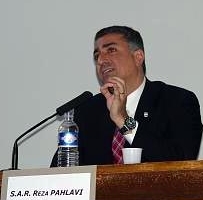Reza Pahlavi's Antidote

May 30, 2004
Reza Bayegan
I said goodbye to an Iranian relative who had come to visit me
from Italy at
Paris's Bercy station before attending Reza Pahlavi's panel
discussion at
Sciences-Po, one of Franceís elite academic institutions. As
he was
embarking his train he held my hand and said: "let me know
what happens at
the meeting."
As the situation in Iran becomes more devastating each day, the
campaign
trail of Reza Pahlavi who is fighting to bring an end to
dictatorship in his
homeland is followed by Iranians with an increasing sense of
urgency. On 25
May 2004, at this French center of learning and enlightenment,
his message
consisted in highlighting the great potential of his nation for
being a
beacon of modernity and stability in the troubled region of the
Middle East.
Referring to the 'obscurantism' as the congenital and incurable
disease of
the Islamic revolution he elucidated its pernicious effect on
Iran's
material and spiritual resources:
"Turning into instruments of religious fascism, the Islamic
Republic has
sapped all the moral and spiritual bases of an ancient country
with several
millennia of civilization and history. The harmful effect of
this type of
fascism is dualistic - it is both temporal and spiritual."
All those Iranians who are able to look at their homeland and
recognize the
weakened body of their nation suffering a fresh blow everyday,
undergoing
another new humiliation and pain by the hour, can identify with
the message
of the king and fathom the depth of his anguish.
Keeping the country up to its neck in unceasing calamity, or as
Reza Pahlavi
calls it a "permanent state of crisis" has from the
beginning of the
revolution been the survival tactic of the dictators in Tehran.
The prime
objective of such a style of governance is to create a state of
moral
fatigue where the political esteem of the population is
constantly assaulted
and its spirit of resistance debilitated.
The main thrust of Reza Pahlaviís campaign for the past two
decades can be
characterized as an antidote to this kind of moral and political
infection.
By constantly encouraging Iranians that they should not settle
for any
destiny except the best they deserve, he has kept alive a
national dream: A
national dream of human excellence, dignity, liberty and
democracy that is
bound to prove itself more powerful than any nightmare concocted
by the
tyrants of the Islamic Republic.
There is no doubt that the force of international pressure can
play a major
role in helping Iranians to fulfill their political aspirations.
World
solidarity in the past has played a major role in overthrowing
tyrannies
such as the Apartheid regime in South Africa. In Sciences-Po,
the Iranian
king reiterated what he has been saying all along: The removal
of the
Islamic Republic is a sine qua non to global security and a
requisite step
for establishing a democratic government in Iran.
Reza Pahlavi attends meetings, conferences and interviews around
the clock.
While owing to his stature, position and impressive character,
all eyes are
turned upon him, his own gaze remains focused on the plight of
his people
and their release from the claws of religious tyranny. He is a
man moving
from standing ovation to standing ovation without being
distracted from the
long term objectives he has devoted his life to accomplish. His
real appeal
comes from his modesty, sincerity and above all lack of any
ambition for
political power for himself.